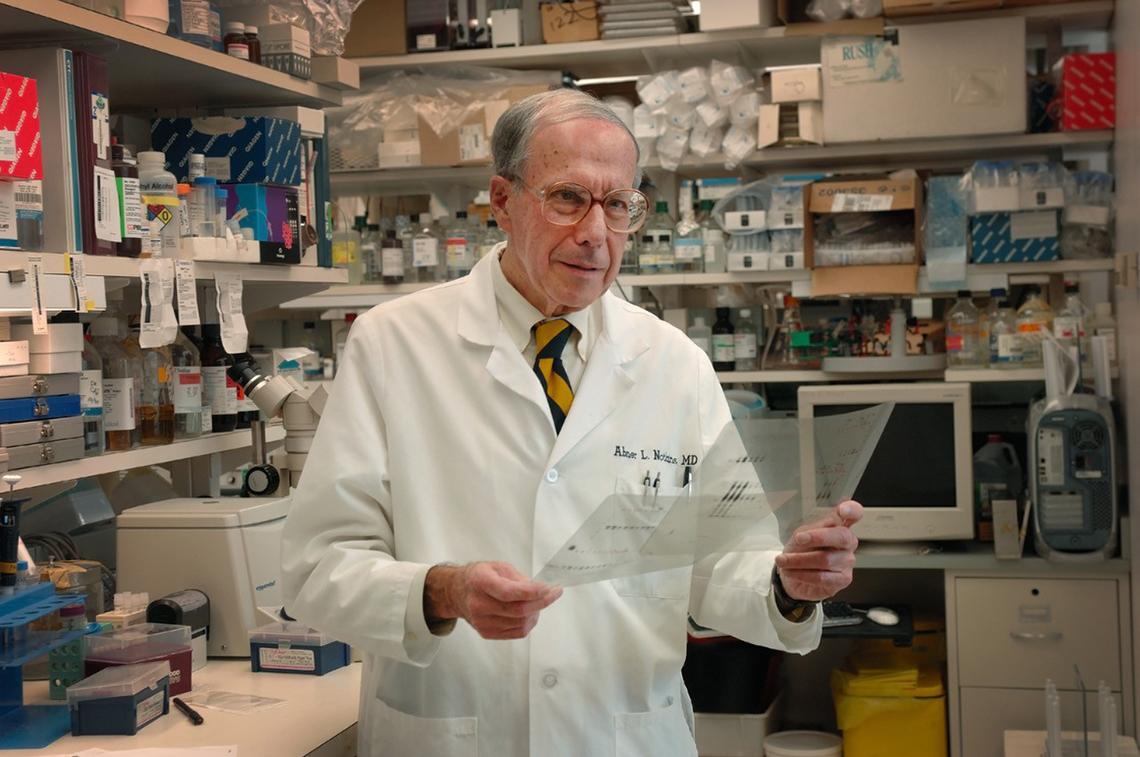Spent Six Decades at NIH
Notkins, Architect of NIH IRP, Remembered

Photo: Michael Spencer
Dr. Abner Notkins, a renowned expert on viral immunology and one of the architects of the modern NIH Intramural Research Program, died of complications from Covid-19 on Mar. 10 at age 90.
Notkins began his career at NIH in 1960, first as a research associate at the National Cancer Institute before moving to what was then called the National Institute of Dental Research (NIDR, now the National Institute of Dental and Craniofacial Research). He became a leader in understanding autoimmune diseases, particularly type 1 diabetes, which he revealed to be an autoimmune reaction associated with a viral infection, a fundamental discovery.
As chief of the NIDR experimental medicine section, Notkins continued to conduct novel research related to diabetes, insulin and other diseases associated with autoimmune antibodies throughout his 60-year NIH career. One standout achievement was his lab’s isolation of a gene that encoded the protein islet antigen-2 (IA-2), now widely used to predict which children are at high risk for developing type 1 diabetes.
Other studies in his lab led to the discovery of immune interferon in the circulation of patients with diseases such as lupus, rheumatoid arthritis and scleroderma. He co-edited five books, held three patents and published nearly 500 peer-reviewed papers that employed molecular biology, genetics and immunology.
Notkins also was an extraordinary NIH citizen. He served as NIDR scientific director from 1985 to 1992. Upon his suggestion and subsequent organization, NIH held its first Research Day in 1986, an annual tradition that lives on today as the NIH Research Festival. He also has provided sage advice to numerous NIH leaders.
“Abner was truly a wonderfully wise and generous man,” said former NIH Director Dr. Francis Collins.
Notkins was born in New Haven, Conn., in 1932. His father was a physician, and his mother was one of the first female real estate brokers in the region. He graduated from Yale University and received his medical degree from New York University, before accepting a residency at Johns Hopkins University.
His many career awards include the David Rumbough Science Award from the Juvenile Diabetes Foundation and the Paul Ehrlich and Ludwig Darmstaedter Prize.
In a 2019 article from Johns Hopkins Medicine titled “Beyond the Dome: Abner Notkins,” he described his long career at NIH and his body of work as “more like a hobby in which I’m totally immersed.”
Notkins said, “NIH allowed me to explore my own ideas, which were mostly curiosity-driven. It also allowed me to spend most of my time in the lab, interacting with fellows and colleagues who were interesting and intellectually provocative. NIH was not always Camelot, but I can’t imagine a better place to do research. I have loved it.”
“Abner loved to chat about his latest research findings and then to question what you were focusing on in anticipation of identifying common ground for forward-thinking collaborative activities,” said Dr. Sharon Wahl, a former NIDCR branch chief and Notkin’s friend and collaborator. “He always had his eye on the goal of translational and ultimately, medically relevant insights. His six decades at NIDCR have certainly had a lasting impact, including the training of myriad fellows as part of his legacy, and his passing will leave a huge void.”
Notkins is survived by his wife, Susan.
Details about his life and career are captured in his 2017 NIH oral history, posted at https://bit.ly/3Gc0PAB.
